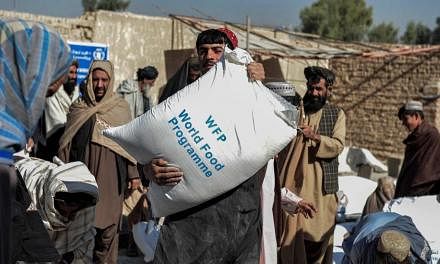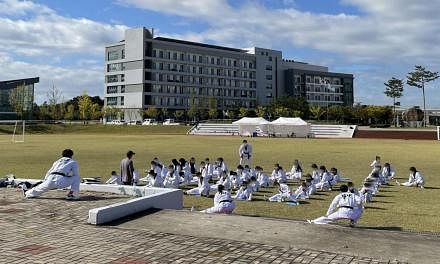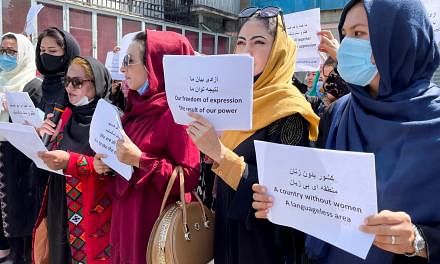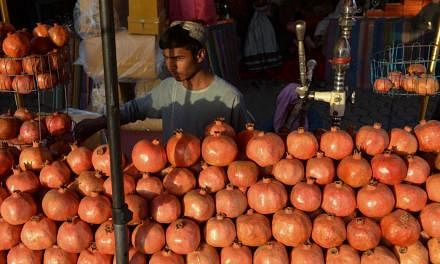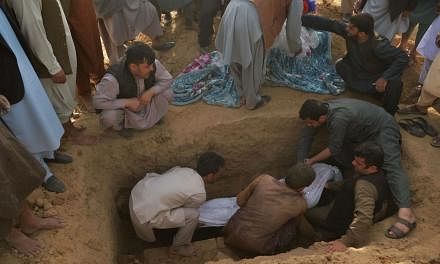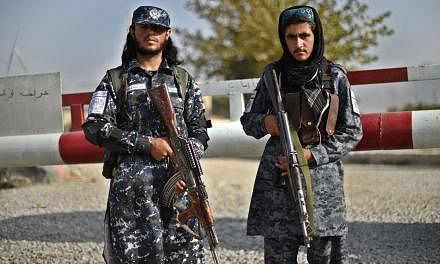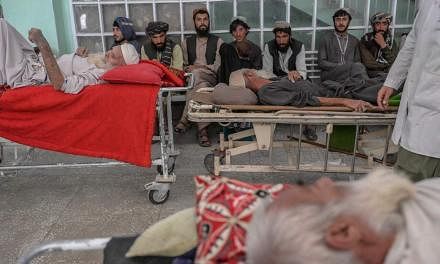TORKHAM, PAKISTAN (NYTIMES) - The Taliban, thankfully, didn't figure out Mr Mohammad was a police officer.
Mr Mohammad, 55, had worked for years in Laghman province east of Kabul, where chasing militants was part of the job. Then the Taliban seized control of Afghanistan. They killed his boss. Mr Mohammad figured he and his family were next.
"We left Afghanistan mainly to protect our lives," said Mr Mohammad, who insisted on being identified only by his first name to protect his extended family from reprisals.
On Aug 16, he, his wife and their five children reached Spin Boldak, a town on the Afghanistan side of the border, before crossing to Chaman on the Pakistan side. To get there, they navigated watchful Taliban and paid Pakistan security forces US$900 (S$1,200) in bribes.
"On the highway, Taliban fighters were stopping and searching travellers," said Mr Mohammad. "But, luckily, they did not recognise me because, maybe, I was a low-ranked cop."
The Pakistan authorities are watching worriedly to see whether more refugees like Mr Mohammad and his family come pouring over the border. The government is expecting as many as 700,000 at a potential cost of US$2.2 billion as the authorities set up camps and ways to track and feed them.
The new arrivals will present political problems for Pakistan's leaders. The country already houses one of the world's largest populations of refugees.
The police and many members of the public treat them like criminals or potential terrorists, according to human rights groups. Already, regional and ethnic leaders are telling the government to turn them away.
One of them is Mr Ayaz Latif Palijo, a leader among the Sindhi ethnic group in Sindh province, where the city of Karachi is based, and who has organised protests against new refugees and hunger strikes among members of his political party. Sindh is already home to refugees from Afghanistan, Bangladesh and Myanmar, some of whom have been there for decades.
"Sindh is not an international orphanage," Mr Palijo said, "and we will not allow more Afghans to live here."
In Balochistan province, officials said Wednesday (Sept 8) that they recently deported more than 500 Afghan refugees, including women and children, for entering the country illegally after the Taliban takeover.
The migration issue has at times added tension along the border. Already, on Wednesday Pakistan's military fired artillery rounds over the border, citing firing from Afghanistan that killed five soldiers - the latest in long-running hostilities as Pakistan forces target suspected insurgents hiding on the other side.
Lieutenant General Faiz Hameed, Pakistan's powerful intelligence chief, listed terrorism and refugees among Pakistan's top concerns at a meeting with Taliban leaders in Kabul over the weekend, according to Mr Fawad Chaudhry, the Pakistani information minister.
The number crossing the border is unclear. So far, say international aid groups and Pakistan officials, the tide of refugees seems to be weaker than expected. Violence in Afghanistan has ebbed. Some are waiting to see what kind of rulers the Taliban will be. And Pakistan has tightened its border controls, including building a 1,600-mile (2,600km) border fence in recent years.
At Torkham, the dusty border crossing about 225km east of Kabul, the Pakistani authorities appeared to be keeping the flow of refugees under strict control. Only small groups of people crossed the border, where only Pakistan citizens and Afghans with visas are allowed to cross.
Hundreds of empty container trucks sat idle on the Pakistan side, evidence of a sharp drop in trade because of the war.
Many of the refugees belong to the Hazara ethnic group, which has suffered persecution at the Taliban's hands.
"We will not go back to Afghanistan now because we are targets of both Taliban and the Islamic State, which considers us infidels," said Mr Sher Ali, 32, a Hazara and a refugee from Kabul who arrived in Karachi with his ill 55-year-old mother and a younger sister.
Border personnel at Chaman-Spin Boldak, he said, allowed them to enter Pakistan on humanitarian grounds.
Many refugees face discrimination. They are often portrayed in Pakistan's news media as drug peddlers and criminals. And, increasingly, terrorists.

"Harassment and exploitation on the part of law enforcement agencies is a product of underlying perceptions of Afghans as violent, dangerous and suspicious," said Dr Zoha Waseem, a sociology professor at the University of Warwick and an expert on policing. "Refugees are therefore viewed with suspicion and seen as an alleged threat to the security of the nation-state. This makes an entire community, including refugee children, at risk of state harassment."
The skepticism left Afghan refugees in a state of uncertainty. Though Pakistan's law allows those born there to get citizenship, the claims of Afghan children are generally not recognised.
Mr Imran Khan pledged to recognise their citizenship after he became prime minister in 2018, but he backed off following a backlash from politicians and the country's powerful military.
For many, the biggest fear is deportation. In 2016, the Pakistani authorities forced more than 500,000 people to return to Afghanistan, according to Human Rights Watch.
The group warned that the move risked adding to a population of hundreds of thousands of people in Afghanistan rendered essentially homeless by poverty and conflict.


